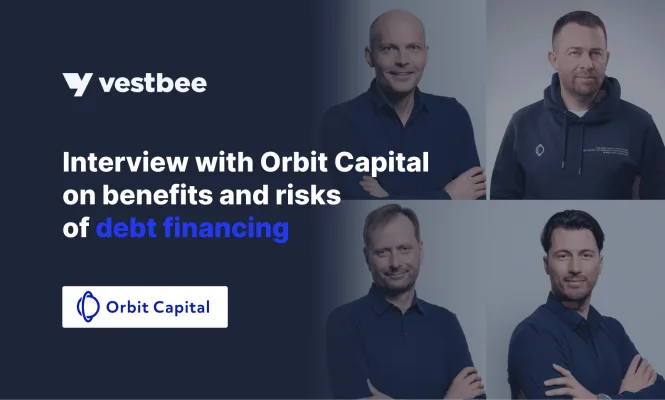In CEE, the growth funding landscape remains challenging. While the market has seen fewer inflated valuations and an abundance of early-stage capital, scaleups still struggle to find financial partners for expansion. Europe's emphasis on larger champions further highlights the gap for soonicorns and smaller ventures — this is where players like Orbit Capital step onto the stage. Based in Prague and Warsaw, the fund offers both growth equity and debt financing to address this need.
Vestbee's Editor-in-Chief spoke with Wiktor Namysl, Jerzy Rozlucki, Radovan Nesrsta, and Lukas Macko from Orbit Capital about how the firm is helping scaleups reach their growth goals through its Growth Equity and Growth Debt funds. The discussion also explored the complexities of debt financing, including how it works, the risks involved, and the advantages it provides for growing companies.
Let's start with your background. What brought you into the world of venture capital and investing? Also, why focus on growth companies?
Jerzy Rozlucki, Partner: Investing is what I have done my whole professional career, over the last 15+ years. I started in a bank, investing in equities on the private market, then I switched to a family office fund. After that, I moved back to banking, but to large transactions in syndicated lending. Afterward, I provided syndicated corporate lending, along with PE and VC funds. This broad experience, spanning both equity and debt, equipped me well to build a growth debt fund in the technology space.
Lukas Macko, Principal: I started my investment career as an M&A advisor and then, since 2019, continued at Orbit, initially covering both debt and equity investments. Over time, I focused only on debt-related transactions. I am a more pragmatic financier, so the growth space was a natural choice for me.
Radovan Nesrsta, General Partner: I have been investing in the venture ecosystem for 15 years now. With the development of our region, I recognized the huge opportunity in funding tech companies in the scaleup phase about 5 years ago. We have quite a few very successful early-stage VCs here in the region that are nurturing an increasing number of startups. The most successful ones sooner or later need new capital to fuel their growth, in amounts that early-stage VCs cannot provide. So, I turned this gap into an opportunity and set up Orbit Capital.
Wiktor Namysl, General Partner: I started as an angel investor, building a portfolio of successful startups and supporting them along their scaling journey. Through this experience, I learned that my abilities and what I like doing match best with the growth stage, so I joined my colleagues from Prague, and together we are building Orbit Capital as a premier growth investment firm in the region. As you can see from our backgrounds, we bring quite differentiated but complementary experience to our firm.
Orbit Capital operates through two funds: Growth Equity and Growth Debt. Can you explain what growth debt means in terms of Orbit Capital?
J.R.: Typically, startups that have not yet achieved profitability do not have access to bank financing, so they are mostly dependent on equity financing from VC funds. But many of them have very healthy and scalable business models and are on a clear path to reaching break even — such companies are ideal candidates for growth debt. At Orbit, we support companies with their core business already proven, but often not yet at the scale sufficient to reach profitability.
For us, “core business” could mean either great unit economics or an already profitable home market or customer segment. In such cases, we help the company grow faster (typically above 40%), and then the debt provided by Orbit would be 4-5x less expensive than equity — from the founders' and early investors' perspective — especially since it is not a convertible loan, but a repayable facility with interest and a small warrant to align interests and share in the success of the company’s growth.
L.M.: Equity provides long-term financing for companies, as VC funds typically invest for 5 to 7 years. On the other end of the spectrum, there's very short-term revenue-based financing, where a share of every income is paid to the providers based on revenue. Growth debt, as in Orbit's case, falls in between.
Our growth financing spans three to four years with longer amortization and some months of an interest-only period, providing companies with capital for growth but also sufficient breathing space. It doesn't weigh heavily on cash flow in the initial period, making it very helpful from a growth perspective. Often, it is an additional boost in the last mile to profitability.
How do you combine both types of scaleup financing — equity and debt financing — within both funds? For example, I've learned that the grocery delivery startup Rohlik is in the portfolio of both funds. How does it work?
R.N.: We don't do any crossovers between the two funds, so it's either debt or equity financing. In the case of Rohlik, which was one of our first debt-financed companies, they have already repaid all the debt financing, and only later, we decided to do an equity round from the Growth Equity fund, so these decisions were separate.
And do you offer revolving loan facilities?
J.R.: Our financing is not revolving, but as we get to know the companies better, we are happy to increase our exposure and provide the next tranches of financing where there is a continuation of good growth.
Talking about scaleup's perspective, what other benefits does debt product have for them?
J.R.: This product has a lot of other advantages apart from being much less expensive than equity: first of all, it allows scaleups to access capital quickly — with an experienced growth debt provider like Orbit, it can be within 12 weeks — to accelerate growth without waiting for VC funds to come in. Secondly, the valuation of the company is not a primary discussion point, so it simplifies a lot. Thirdly, it allows postponing the next equity round and lowering dilution.
L.M.: Scaleups can also complement a smaller equity round with debt, reducing dilution while maintaining growth capacity. Or they can just add growth debt on top of the last round and accelerate.
R.N.: But one of the important benefits is our support for the company: we typically take a board observer seat and help the company in multiple ways — helping in the growth plan itself, leveraging our great network of experienced founders, helping to think through the optimal financing structure, or assisting in assessing financial risk levels. We are very familiar with scaleups and their challenges in that phase of growth and are happy to share this experience with our companies.
Are there any risks associated with this product that companies should be aware of when applying for it?
J.R.: The risk is typical for all debt financing taken by companies: the debt needs to be repaid. The difference between us and banks is that we are much more incentivized by the further growth of the company, as we hold warrants, so we are always trying to find a good solution for both us and the company.
R.N.: We are incentivized to help the companies grow and thrive. At Orbit, we have been operating for 4 years and are here to stay, so the reputation of a supportive partner is very important to us.
What other criteria should the companies meet? Who is your client?
J.R.: Our companies are usually healthy, growing companies, with at least 30-40% annual growth. This growth has to be grounded in a solid business model, so we look for companies that already have a well-proven product-market fit, with a minimum of €3 million in revenues. Profitable unit economics are critical for us, as our debt is used to scale the business. We also prefer companies with financial investors (like VC funds) on board, as they provide more stability, require solid reporting, and can help in difficult times. Our typical investees are companies valued between €30-€100 million in recent equity rounds.
When discussing European banks, why don't they offer similar products, or why don't we hear much about them?
W.N.: I think banks are becoming interested in this market, but they have regulatory challenges and different ways of thinking. They are trying to get there, but there's a bit of a long process ahead of them.
For us, coming from the equity world, it's a different story. We understand tech businesses, scaleups, and the associated risks, including how companies pivot and adapt. We also value the importance of the teams facing these challenges. Our experience in the tech and startup sectors gives us the confidence to invest in these companies for the long term.
For banks, I think it's just the opposite; they come from a very different world with real assets as collateral and EBITDA-positive companies. So, mindset-wise, it's a challenging path for them to navigate. But banks are already trying in much larger deals for well-established scaleups operating at break-even levels — we see them as the next financing partner for our companies as well.
Venture debt seems to be relatively unknown, despite its presence on the market for decades. Why is that?
J.R.: Let's start with the big picture. In the US, there are over 100 venture debt funds, making it quite popular. Many of them have been financing a couple of the most successful technology champions.
In Europe, debt financing for startups is already quite popular in London, with more than 20 debt funds, but in the rest of Europe, it is still a single-digit number per country. And the further you go to the East, the fewer funds you have — in CEE, we noticed three. But even in Western markets, this product is relatively new — it's been years, but not decades.
On the other hand, venture debt is quite a complex product. Understanding both traditional credit financing and warrant or equity-like components makes it more complex. Also, the legal documentation involved and the type of due diligence required are different. That's why I think it's not easy to develop and offer such a product in the market.
L.M.: On the demand side, I looked into the pipeline before the meeting. The Orbit team has reviewed approximately 900 project applications between 2021 and 2023. Of course, the large majority of these proposals don’t fit our criteria — typically, they are too early in their development. Actually, if we were to say we get one proposal daily, I would consider this already significant demand. Out of those 900 transactions, we closed 14, resulting in a pass rate below 2%, which also allows us to be very selective.
R.N.: Debt is a much cheaper source of funding than equity, although not every company is ready to take it. Let me explain why. To provide debt, we need to be sure that there is stable cash flow enabling repayments. This means we strongly prefer companies with recurring revenues. Not all startups have this; many are still focused on R&D and other one-off projects.
Secondly, because the process is quite work-intensive, the loan amounts we offer are typically in the range of €3-€5 million; exceptionally, we would offer a bit less than that. Companies that can afford and effectively utilize such loans usually need to reach a certain size. When discussing software companies, we would like to see at least €3 million in annualized recurring revenues.
Many companies apply to us without considering this requirement initially. It's good to talk to us in the early stages, even if your revenue is only one or two million. We appreciate having an initial quick call and introduction and then observing how the company develops over time. Returning a year or two later often leads to a much stronger relationship.
So, this kind of immaturity in terms of becoming your portfolio company is not a no-go for you; it's actually the situation you would prefer to have.
J.R.: We definitely prefer this approach. We had an experience with a Polish company. While getting to know them, we came to the conclusion that it was a little bit too early for debt financing — we didn't yet see the product-market fit fully confirmed, and we felt the company still needed to build up its revenue. This is also part of safeguarding on our side, getting to know the company before we fund it.
L.M.: It's important for companies to talk to us even before planning their next financing round to strategize how much equity versus debt they want to raise. In the past, everyone said if you're a startup, you need to raise equity, end of story. Or perhaps even a grant if it's an early-stage company. Nowadays, there's also a place for debt financing. Instead of raising 10 million solely through equity, it might make sense to raise, say, 7 million through equity and 3 million through debt. This kind of strategic decision-making should happen early in the discussion process rather than after the funding round when it may be too late.
Let's talk about the growth funding landscape in the CEE. Wiktor, in your interview, you noted the reliance of CEE growth funding rounds on Western European and US funds due to a lack of local funds. You also mentioned a capital gap in these rounds. How does this situation look now compared to last year? Have any changes or new trends been emerging?
W.N.: The market is now more reasonable. We don't have early-stage funds financing just anybody, nor do we have follow-on rounds with crazy valuations. The situation is not calm or stable; it's just become much more reasonable. I think that's the right word.
At the early stage, there's still a lot of capital available. Good ideas get funded. At the growth stage, the situation remains unchanged. Getting an investment ticket worth more than €5 million from an Eastern European fund is relatively difficult. Some funds are trying to enter that market but would rather look at EBITDA-positive companies.
There are very few companies that are day-one global and immediately present on the global markets. But there are many more emerging champions who have already proven their market here and need to expand market by market. They have difficulties finding partners to embark on the journey from the financial side. So here, we still see pretty much the same gap and ideal space for Orbit.
The European Union has also noticed that gap and is now putting significant money into the champions. The problem is that they want to invest in the very big champions, not the soonicorns or emerging champions, especially from our region. So here, we clearly see our role in supporting that segment.
That's a great vision. What's the plan moving forward? What's next for Orbit Capital?
R.N.: Currently, we are well advanced in fundraising for our Growth Debt II fund. We plan to close it by year-end and are still open to investors/LPs. Nonetheless, we still have dry powder in Growth Debt I, allowing us to proceed with transactions and deploy capital immediately.
W.N.: Similarly, we are also fundraising for our Equity Fund II. For both funds, we are engaging with the full spectrum of Limited Partners, ranging from institutional investors and private family offices to high-net-worth individuals with tickets of at least €1 million to invest. We believe we offer a very compelling risk-return proposition because the growth stage involves more alignment on expansion plan assumptions based on proven business models rather than betting on statistical risks.
Therefore, as we build our portfolio, we typically see 4-5x returns, and our fund model assumes in worst cases at least a money-back scenario. So for investors who don't want to take the full risk of early-stage startups, this provides a very good combination of strong downside protection and very good equity upside.
Finally, I have a question that I hope will be helpful for companies: What's the best way to reach you?
J.R.: We have offices in Prague and Warsaw, so it depends on which geography you are from and where you are closer to coming by. But we are all very open and approachable. It's a very small, intimate firm where we interact on a daily basis, so you can reach any of us directly or through our website.







